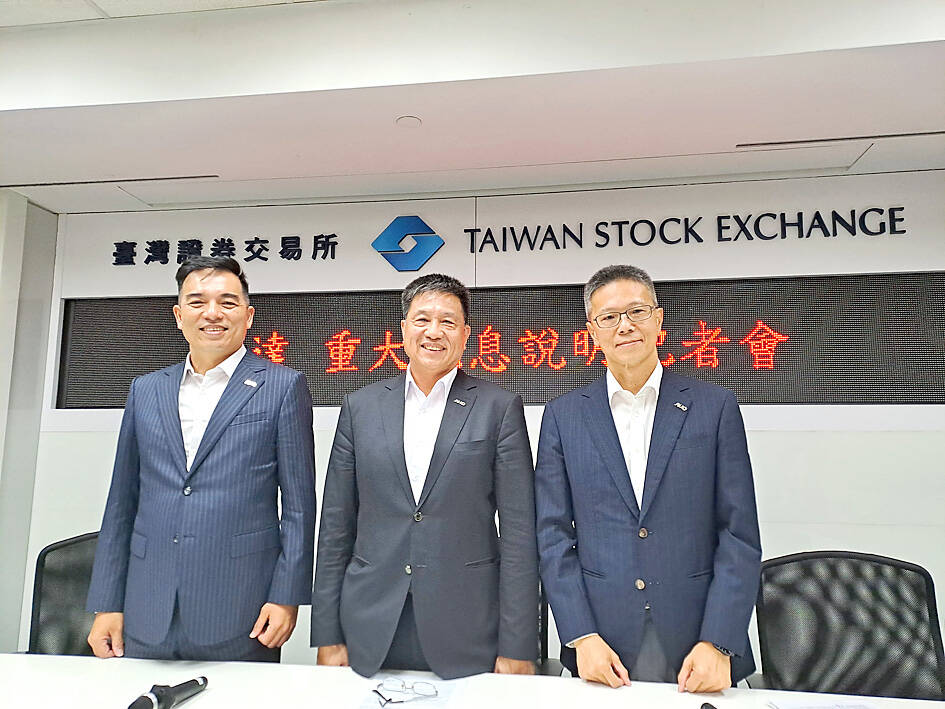AUO Corp (友達) on Monday said it would fully acquire Germany’s Behr-Hella Thermocontrol GmbH (BHTC) for 600 million euros (US$628.6 million) as the Taiwanese flat-panel maker accelerates its expansion into the auto parts market.
The deal would enable AUO to extend its business from vehicle display solutions to BHTC’s intelligent cockpit operation system solutions and other automotive applications, the company said.
“Acquiring BHTC is significant for AUO’s expansion in the automotive market, which is an area with strong growth potential,” AUO chairman Paul Peng (彭?浪) told a news conference in Taipei.

Photo: CNA
Peng said the deal would allow AUO to expand its manufacturing sites globally sooner, as BHTC manages factories in Europe, North America, India and China.
It also represents a vital step for the company to diversify from the flat-panel business, which is famous for its boom-and-bust cycles, he said.
The company has viewed electric mobility as becoming a standout industry in the next 10 years with strong growth potential, AUO president Frank Ko (柯富仁) said.
The deal would help enhance the company’s supply of intelligent cockpit operation system solutions and fuel its growth over the next few years, Ko said.
“AUO should benefit from the acquisition of BHTC in the mid-to-long term,” researcher TrendForce Corp (集邦科技) said yesterday, referring to BHTC’s customer base and global deployment.
TrendForce said the deal would help AUO enter a new business segment, as BHTC is the world leader in climate control units and an expert in human-machine interface solutions.
BHTC counts Audi AG, Bentley Motors Ltd, BMW AG, Tata Motor Ltd, Mercedes-Benz AG and Nissan Motor Co among its customers, the company’s Web site showed. It generated 619 million euros in revenue last year.
AUO plans to acquire the German company in cash, given its strong cash position totaling NT$90.5 billion (US$2.8 billion) as of June 30.
The deal would not negatively affect the company’s financial health, AUO chief financial officer Benjamin Tseng (曾昱智) said, adding that BHTC has been generating cash from its operations over the past three years.
The acquisition is subject to antitrust and regulatory approval in Taiwan, Germany and Mexico, AUO said.
It expects the deal to close by the middle of next year.

Taiwan Semiconductor Manufacturing Co (TSMC, 台積電) would not produce its most advanced technologies in the US next year, Minister of Economic Affairs J.W. Kuo (郭智輝) said yesterday. Kuo made the comment during an appearance at the legislature, hours after the chipmaker announced that it would invest an additional US$100 billion to expand its manufacturing operations in the US. Asked by Taiwan People’s Party Legislator-at-large Chang Chi-kai (張啟楷) if TSMC would allow its most advanced technologies, the yet-to-be-released 2-nanometer and 1.6-nanometer processes, to go to the US in the near term, Kuo denied it. TSMC recently opened its first US factory, which produces 4-nanometer

GREAT SUCCESS: Republican Senator Todd Young expressed surprise at Trump’s comments and said he expects the administration to keep the program running US lawmakers who helped secure billions of dollars in subsidies for domestic semiconductor manufacturing rejected US President Donald Trump’s call to revoke the 2022 CHIPS and Science Act, signaling that any repeal effort in the US Congress would fall short. US Senate Minority Leader Chuck Schumer, who negotiated the law, on Wednesday said that Trump’s demand would fail, while a top Republican proponent, US Senator Todd Young, expressed surprise at the president’s comments and said he expects the administration to keep the program running. The CHIPS Act is “essential for America leading the world in tech, leading the world in AI [artificial

REACTIONS: While most analysts were positive about TSMC’s investment, one said the US expansion could disrupt the company’s supply-demand balance Taiwan Semiconductor Manufacturing Co’s (TSMC, 台積電) new US$100 billion investment in the US would exert a positive effect on the chipmaker’s revenue in the medium term on the back of booming artificial intelligence (AI) chip demand from US chip designers, an International Data Corp (IDC) analyst said yesterday. “This is good for TSMC in terms of business expansion, as its major clients for advanced chips are US chip designers,” IDC senior semiconductor research manager Galen Zeng (曾冠瑋) said by telephone yesterday. “Besides, those US companies all consider supply chain resilience a business imperative,” Zeng said. That meant local supply would

Servers that might contain artificial intelligence (AI)-powering Nvidia Corp chips shipped from the US to Singapore ended up in Malaysia, but their actual final destination remains a mystery, Singaporean Minister for Home Affairs and Law K Shanmugam said yesterday. The US is cracking down on exports of advanced semiconductors to China, seeking to retain a competitive edge over the technology. However, Bloomberg News reported in late January that US officials were probing whether Chinese AI firm DeepSeek (深度求索) bought advanced Nvidia semiconductors through third parties in Singapore, skirting Washington’s restrictions. Shanmugam said the route of the chips emerged in the course of an